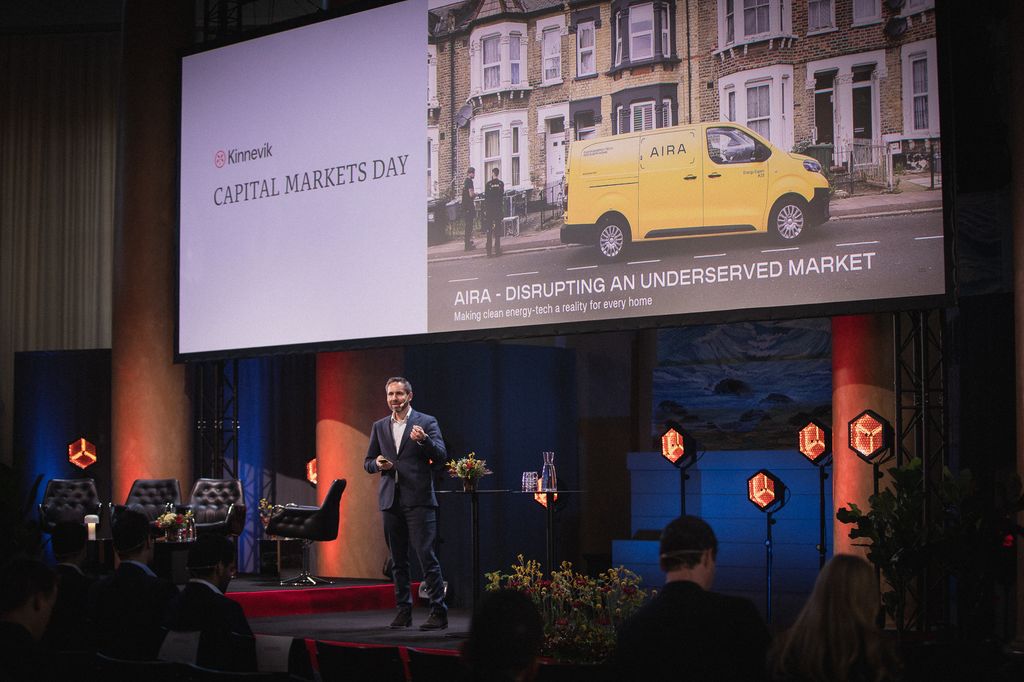
Kinnevik's climate tech strategy
A history of challenging the norm
A consistent theme runs through our almost one-hundred-year history: challenging established norms and incumbents through disruptive technologies and bold business models. This heritage lives on as we back the next generation of challenger businesses, focusing our investments in three main sectors: Software, Health & Bio and Climate.
The climate crisis is the most urgent challenge of our time, and by investing in companies tackling these critical issues, we're extending that legacy with purpose.
It started with a global crisis
When we entered the climate space, two powerful forces drew us in. The first was the undeniable urgency of the climate crisis. Emissions were at record highs, and rising global temperatures and extreme weather events were becoming alarmingly tangible. This created both a moral imperative and a market opportunity, as a new wave of entrepreneurs stepped up to tackle one of humanity’s greatest challenges, and incumbents across industries looked for solutions to rapidly decarbonise.
At the same time, we witnessed a step-change in the quality of climate tech companies raising capital. Innovations were emerging that weren’t just cleaner than legacy solutions - they were cheaper and better. For the first time, sustainability and cost-efficiency were no longer at odds. Many of these businesses were addressing massive markets and had the potential to deliver near-term impact, with strong defensibility and based on proven technology. This convergence of critical need, urgency and opportunity made climate an obvious area for long-term investment and further innovation.
We had a compelling proposition for entrepreneurs building climate companies: a legacy of backing transformative businesses, combined with a permanent and flexible capital base not constrained by fund cycles. We deeply believe that climate is one of the defining frontiers of innovation today - on par with the major technological shifts of the past. It’s not just about doing good; it’s about backing high-potential companies with the ability to deliver both meaningful climate impact and outsized returns, alongside other co-benefits such as supply chain security. Our commitment to climate is grounded in the same investment discipline we apply across all sectors: long-term value creation at scale.
Furthermore, at Kinnevik sustainability has been central to our operations since 2020, and it's an area where we lead among our peers. We’ve embedded sustainability across our investment process, with commitments to reduce the greenhouse gas intensity of our portfolio by 50 percent by 2030. We’ve also topped the Venture Capital category in the Honordex Inclusive PE & VC Index for three consecutive years.

Where big emissions meet big opportunity
One of our first focus areas in Climate investing was green supply chains. The industrial sector is responsible for around 25 percent of global emissions, with steel and chemicals among the most carbon-intensive areas. But these sectors also represent some of the biggest opportunities for innovation: large, global markets where better solutions can unlock both climate impact and commercial returns. As industries such as automotive, consumer goods, and food and beverage companies accelerate toward net-zero targets, demand for low-carbon supply chains is rising fast. We profile the largest climate companies in our portfolio below.
Our first investment was in Agreena in 2021. Founded by Simon Haldrup and Julie Koch Fahler, Agreena is a platform that enables farmers to adopt regenerative practices - such as reduced tillage, cover cropping, and crop rotation - that improves soil health and stores carbon in the ground. Agriculture covers 50 percent of the world’s land and the food supply chain contributes to 30 percent of global emissions. Soil sequestration is recognised by the ICCP as the most scalable carbon removal solution, and can remove up to 3.0bn gigatonnes of C02 equivalents per year if applied at scale. Through Agreena’s platform, farmers can immediately reap the benefits of regenerative farming, through the sale of carbon credits as well as the ability to offer improved supply chain visibility, a key priority for their customers.
We first led Agreena’s Series A round of EUR 20m in 2022 alongside Giant Ventures and the Danish state’s investment fund Vaekstfonden and later continued supporting the company through its Series B led by HV Capital. We have been impressed with Agreena’s progress since, growing its hectares under management from a few hundred thousand at our first investment to +4.5m, recently landing its Verra certification as well as a partnership focused on supply chain visibility with Mars. You can check out Anna Adlarson’s piece to learn more about why we consider Agreena as the leader in regenerative agriculture here.
We then co-led Solugen’s USD 200m round in October 2022. Founded by Gaurab Chakrabarti and Sean Hunt, Solugen has developed a process to produce green chemicals from non-fossil fuel feedstocks, at low temperatures and with high yields. Using a proprietary family of enzymes and metal catalysts, the Solugen process converts plant sugars into essential chemical products. This allows the company to offer a cleaner, cheaper and safer alternative to traditional petrochemical production, addressing a USD 6tn chemicals market, accounting for roughly 6 percent of global emissions. Since our investment, the Solugen team has continued to scale production and sales of its early products, secured a USD 213m commitment from the US Department of Energy’s Loan Programs Office to finance a second, larger, commercial production facility, and has continued to progress its pipeline molecules, most notably with a USD 2m initial funding award from the US Department of Defence to design a facility for cost-effective domestic production of critical chemicals.
We next invested in Stegra (formerly ‘H2 Green Steel’), a company tackling one of the most difficult industries to decarbonise: steel. By creating a next generation, vertically integrated greenfield plant, using 100% renewable power, and 100% green hydrogen to reduce iron ore into green iron, Stegra is reinventing how green steel is produced. We first invested in Stegra’s EUR 260m round in 2022, and since then, the company has made strong progress on its flagship facility in Boden. Steelmaking accounts for over 7 percent of global emissions. Stegra’s technology is expected to reduce emissions by up to 95 percent compared to traditional methods of steel production. In addition, moving to green steel is one of the most effective ways to reduce C02 emissions. For instance, steel is one of the largest C02 contributors in an EV, however represents only a fraction of the cost. With significant geographic cost advantages, including access to low-cost renewable energy, and a digital-first approach, Stegra is well-positioned to lead in green steel production, where demand is expected to significantly outstrip supply for the foreseeable future.
Powering the next great transition
Our second area of focus is the energy transition. With a backdrop of surging electricity demand, growing share of renewable energy sources, and rising geopolitical uncertainty, access to secure and reliable energy sources, and reducing energy costs and volatility, have become strategic priorities for companies across industries and geographies. Electrification, industrial decarbonisation, and the rise of AI all depend on abundant and affordable green energy, the fastest and cheapest way to bring new energy supply into the system. Yet, grid infrastructure is struggling to keep pace and adapt to the intermittent nature of renewable energy supply, creating bottlenecks, lengthy connection delays, cost inefficiencies, and growing risks of power shortages.
We’re seeing exceptional founders reimagining the entire energy stack - tackling critical pain points across grid infrastructure, intelligent energy management, and end-use optimisation. Our focus includes AI-powered tools that improve efficiency, reduce consumption, cut costs, and connect supply and demand assets to the flexibility market. We're also exploring technologies that enhance grid reliability and prepare infrastructure for rising demand as well as those that accelerate renewable integration and storage - unlocking a cleaner, more scalable, and future-proof energy system.
We invested in Aira in 2024, a company leading the adoption of intelligent heat pumps across Europe. Founded by Martin Lewerth, Aira is rethinking residential heating - responsible for 10 percent of Europe’s C02 emissions - by offering a cleaner, more cost-effective alternative to gas boilers. We invested alongside Temasek and Altor, and recently supported Aira in an extension round to accelerate its rollout in Germany, Italy and the UK. At a time when Europe is grappling with both climate goals and rising living costs, Aira’s model delivers on both fronts.
Backing the builders of a low-carbon future
Momentum is building across the climate tech landscape. We believe this is just the beginning and, regardless of political fluctuations, the transition to a decarbonised economy is inevitable – accelerated by the increasing economic and quality superiority of many green products and services.
At Kinnevik, we’re uniquely positioned to support this shift. Our history of scaling transformative businesses - from industrials to telecoms & media to next-generation platforms like Spring Health and TravelPerk - gives us a deep understanding of how to back companies navigating massive, systemic change. This is in addition to our strong brand and network within climate tech, our dedicated team focused on the sector, and the value we bring to our companies through our platform, including supporting with commercial networks and capital raising, hiring and organisational structure.
The climate companies we've partnered with are entering their next phase of growth. In 2025, we expect several to hit critical milestones - from commercial scale-up to deeper integration into global supply chains. Looking ahead, we’ll continue to focus our efforts on the same two high-impact areas: green supply chains and the energy transition. Within those areas, we’ll seek out companies that are playing in large markets, with near-term impact, strong defensibility, innovative teams and proven technology, as we have done since we began investing in climate.
The shift to a low-carbon economy is the defining industrial transformation of our time. We’re committed to backing the bold companies building the infrastructure, technologies and platforms that will power it over the coming decades.



